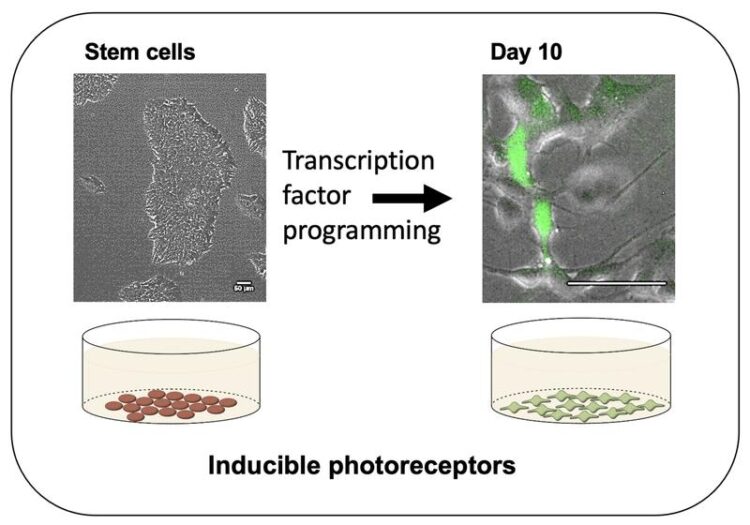With stem cells against blindness

The technology. Human stem cells are differentiated into photoreceptor. These cells are essential for drug screening, further basic and disease research including photoreceptor replacement therapies.
© Volker Busskamp
ERC Proof of Concept Grant to biotechnologist at the University of Bonn
Prof. Volker Busskamp from the University of Bonn has received a “Proof of Concept Grant” worth 150,000 euros from the European Research Council (ERC). He and his team are working at the Eye Clinic of the University Hospital Bonn on a technology to rapidly program human stem cells to photoreceptor for retinal research and treating blindness in the future.
Prof. Volker Busskamp from the University of Bonn has received a “Proof of Concept Grant” worth 150,000 euros from the European Research Council (ERC). This funding line is intended to support scientists in transferring their research results from previous ERC projects into commercial applications. Volker Busskamp and his team are working at the Eye Clinic of the University Hospital Bonn on a technology to rapidly program human stem cells to photoreceptor for retinal research and treating blindness in the future.
Volker Busskamp’s research focuses on photoreceptors. These are sensory cells of the retina that convert light into electrochemical signals. These stimuli are processed further and enable that seeing. Photoreceptors have special antennae, so-called outer segments, which are very fragile and are the first to degenerate in many eye diseases causing blindness. Busskamp and his team are aiming to protect and restore the structure and function of such photoreceptor cells.
Based on his ERC Starting Grant, which was launched at the Dresden University of Technology in 2016 and funded with 1.5 million euros, Volker Busskamp and his team have succeeded in developing a technology to precisely differentiate human stem cells into photoreceptor cells. Having an unlimited photoreceptor cell source is essential for drug screening, further basic and biomedical research such as photoreceptor replacement therapies.
With the help of Proof of Concept funding, he and his team aim at bringing their discovery closer to the market. This includes further technology developing, defining end products and approaching industry partners. “Our long-term goal is to use our research to develop new drugs that can effectively treat late stages of retinal degeneration and blindness,” Volker Busskamp emphasizes.
Working on future-relevant research topics
The ERC Proof of Concept Grant has been awarded since 2011 and has a funding period of one year. 55 researchers from 21 countries will receive funding this year. This is the first time that an ERC Proof of Concept Grant has been obtained at the University of Bonn.
Volker Busskamp is a member of the Immunosensation2 Cluster of Excellence and the Transdisciplinary Research Area (TRA) “Life and Health” at the University of Bonn. In six different TRAs, scientists from the various faculties and disciplines come together to work on future-relevant research topics at the University of Excellence.
Wissenschaftliche Ansprechpartner:
Prof.Volker Busskamp
Eye Clinic at the University Hospital Bonn
Phone: +49-(0)228-28713687
Email: volker.busskamp@uni-bonn.de
Weitere Informationen:
https://erc.europa.eu/news/PoC-recipients-2020-third-round ERC press release
https://erc.europa.eu/news-events/magazine/PoC-2020-third-round-highlights ERC project presentation
Media Contact
All latest news from the category: Awards Funding
Newest articles

High-energy-density aqueous battery based on halogen multi-electron transfer
Traditional non-aqueous lithium-ion batteries have a high energy density, but their safety is compromised due to the flammable organic electrolytes they utilize. Aqueous batteries use water as the solvent for…

First-ever combined heart pump and pig kidney transplant
…gives new hope to patient with terminal illness. Surgeons at NYU Langone Health performed the first-ever combined mechanical heart pump and gene-edited pig kidney transplant surgery in a 54-year-old woman…

Biophysics: Testing how well biomarkers work
LMU researchers have developed a method to determine how reliably target proteins can be labeled using super-resolution fluorescence microscopy. Modern microscopy techniques make it possible to examine the inner workings…





















